
-
 Israel says it killed Hezbollah chief in Beirut strike
Israel says it killed Hezbollah chief in Beirut strike
-
Ukraine says nine killed in Russian strikes on hospital
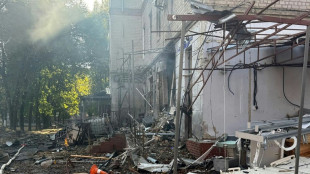
-
 WADA appeals, seeks ban as Sinner doping case reignites
WADA appeals, seeks ban as Sinner doping case reignites
-
Sri Lanka scent series victory as New Zealand 129-5 after follow-on

-
 Clarke's two tries help All Blacks to 33-13 win over Wallabies
Clarke's two tries help All Blacks to 33-13 win over Wallabies
-
Storm Helene kills 44, threatens more 'catastrophic' flooding
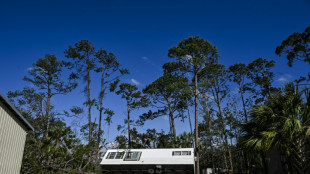
-
 Israel says it 'eliminated' Hezbollah chief in Beirut strike
Israel says it 'eliminated' Hezbollah chief in Beirut strike
-
FIFA ban Argentina goalkeeper Martinez for 'offensive behaviour'

-
 Bagnaia halves Martin's MotoGP lead with Indonesia sprint win
Bagnaia halves Martin's MotoGP lead with Indonesia sprint win
-
WADA appeals, seeks ban after Sinner cleared in doping case

-
 WADA appeals after tennis No.1 Sinner cleared in doping case
WADA appeals after tennis No.1 Sinner cleared in doping case
-
Hezbollah chief's fate uncertain as Israel pounds Lebanon

-
 Jayasuriya takes 6-42 as New Zealand collapse to 88 all out
Jayasuriya takes 6-42 as New Zealand collapse to 88 all out
-
Thousands bid farewell to Tokyo zoo pandas before return to China

-
 Israeli strikes pound Hezbollah's south Beirut bastion
Israeli strikes pound Hezbollah's south Beirut bastion
-
Austria Greens leave transport pass as legacy ahead of vote

-
 Paul stunned by Machac as Japan Open upsets keep coming
Paul stunned by Machac as Japan Open upsets keep coming
-
Abortion rights worldwide: a snapshot

-
 Martin claims Indonesia MotoGP pole by smashing lap record
Martin claims Indonesia MotoGP pole by smashing lap record
-
Belgian exorcist offers 'healing' -- and combats cliches

-
 Boeing strike grinds on as latest talks fail to reach agreement
Boeing strike grinds on as latest talks fail to reach agreement
-
Israeli strikes pound southern Beirut suburbs

-
 No choice: Braving the Darien jungle to flee Maduro's Venezuela
No choice: Braving the Darien jungle to flee Maduro's Venezuela
-
Iran 'news' sites, hackers target Trump ahead of US election
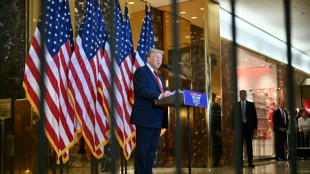
-
 US ports brace for potential dockworkers strike
US ports brace for potential dockworkers strike
-
China's 'red collectors' cherish bygone Maoist era

-
 Japan's speedy, spotless Shinkansen bullet trains turn 60
Japan's speedy, spotless Shinkansen bullet trains turn 60
-
Harris vows migration crackdown, reform as she finally visits border

-
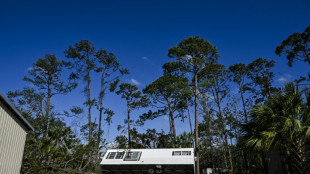 US hurricane deaths rise to 44, fears of more 'catastrophic' flooding
US hurricane deaths rise to 44, fears of more 'catastrophic' flooding
-
Brazil judge says will lift Musk's X ban if $1.8 mn fine paid

-
 White Sox break MLB record for defeats in a season
White Sox break MLB record for defeats in a season
-
Jasmine Suwannapura grabs LPGA NW Arkansas lead

-
 Chappell Roan axes gigs after backlash over US election stance
Chappell Roan axes gigs after backlash over US election stance
-
Harris visits border to neutralize weak spot against Trump

-
 Aussie Scott revels in Presidents Cup rally for global golfers
Aussie Scott revels in Presidents Cup rally for global golfers
-
Milei moves to privatize flag carrier in standoff with unions

-
 Ethiopian actions 'flagrantly violate' Somali territorial integrity: Somali PM
Ethiopian actions 'flagrantly violate' Somali territorial integrity: Somali PM
-
Blinken questions China peace push over Russia help

-
 Internationals sweep foursomes to equal USA at Presidents Cup
Internationals sweep foursomes to equal USA at Presidents Cup
-
Brook says return to form 'a matter of time' as England hammer Australia

-
 Clark takes aim at 'trolls' in WNBA racism storm
Clark takes aim at 'trolls' in WNBA racism storm
-
'We're desperate': Mexico's Acapulco relives hurricane nightmare

-
 Israel, Hezbollah must both 'stop firing': Blinken
Israel, Hezbollah must both 'stop firing': Blinken
-
Barcola leads PSG to win over Rennes

-
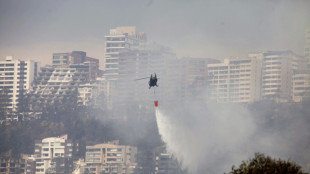 Why South America is burning
Why South America is burning
-
AC Milan join Torino at Serie A summit by thumping Lecce

-
 'Super' Serhou Guirassy sparks Dortmund comeback win over plucky Bochum
'Super' Serhou Guirassy sparks Dortmund comeback win over plucky Bochum
-
Global stocks mostly rise, cheering Beijing stimulus

-
 Maduro's hold on power 'unsustainable': Venezuelan opposition leader to AFP
Maduro's hold on power 'unsustainable': Venezuelan opposition leader to AFP
-
Guinea's Guirassy sparks Dortmund comeback win over plucky Bochum


Hezbollah chief's fate uncertain as Israel pounds Lebanon
Israeli jets bombarded the southern suburbs of Beirut Saturday, sending panicked families fleeing amid uncertainty over the fate of Hezbollah chief Hassan Nasrallah, reportedly the target of earlier air strikes.
Israel said it was attacking the Iran-backed group's headquarters and weapons facilities in the Lebanese capital, and Israeli and US media reported Nasrallah was the target of strikes Friday night, although a source close to Hezbollah said he was "fine".
The blasts that rocked southern Beirut Friday were the fiercest to hit the group's stronghold since Israel and Hezbollah last went to war in 2006.
An AFP photographer said dozens of buildings in the district were destroyed.
After heavy strikes sounded across the Mediterranean city Friday, Israel issued fresh warnings for people to leave part of the densely populated Dahiyeh suburbs before dawn.
Hundreds of families spent the night outside, in central Beirut's Martyrs' Square or along the seaside boardwalk area.
South Beirut resident Rihab Naseef, 56, slept outside a church.
"I didn't even pack any clothes, I never thought we would leave like this and suddenly find ourselves on the streets," Naseef told AFP.
Israel's military also announced "extensive strikes" on the Beqaa area in eastern Lebanon and on the south, saying it hit "dozens of terror targets".
It said a surface-to-surface missile fired from Lebanon fell in an open area in central Israel.
Israel's military declined to comment on Nasrallah, but claimed Saturday to have killed "Muhammad Ali Ismail, commander of Hezbollah's missile unit in southern Lebanon, as well as his deputy and "other senior officials".
The Lebanese group, which normally confirms major deaths among its ranks on the same day, has yet to comment on Nasrallah's fate.
- 'Precise strike' -
Hours earlier at the UN General Assembly, Israeli Prime Minister Benjamin Netanyahu vowed to keep fighting Hezbollah until the country's northern border with Lebanon was secured.
"Israel has every right to remove this threat and return our citizens to their homes safe," he said.
Hezbollah began low-intensity cross-border attacks a day after its Palestinian ally Hamas staged its unprecedented attack on Israel on October 7.
Israel has over the past few days shifted the focus of its operation from Gaza to Lebanon, where heavy bombing has killed more than 700 people and sparked an exodus of around 118,000 people.
Israeli military spokesperson Daniel Hagari said Friday a "precise strike" hit Hezbollah's "central headquarters" underneath residential buildings in Dahiyeh.
Lebanon's health ministry gave a preliminary toll of six dead and 91 wounded.
In the Haret Hreik neighbourhood, an AFP photographer saw craters up to five metres (16 feet) wide left by the blasts.
"I felt like the building was going to collapse on top of me," said Abir Hammoud, a teacher in her 40s.
A second wave of attacks in the same area followed early Saturday, as the Israeli military said it warned civilians to get away from three buildings in the heart of Dahiyeh.
Early Saturday, Hezbollah claimed a rocket attack on kibbutz Kabri in northern Israel, "defending Lebanon and its people".
Israel's military said sirens sounded in the north.
Hezbollah later said it launched "a salvo of Fadi-3 rockets" towards the Ramat David airbase in northern Israel.
- 'Incredibly exhausting' -
Israel this week raised the prospect of a ground operation against Hezbollah, prompting widespread international concern.
"We must avoid a regional war at all costs," UN chief Antonio Guterres told world leaders, again appealing for a ceasefire.
In Israel, too, many were weary of the violence.
"It is incredibly exhausting to be in this situation. We don't really know what's going to happen, there's talk of a ground offensive or a major operation," said student Lital Shmuelovich.
At the UN, Netanyahu also addressed the war in Gaza, saying that Israel's military would continue to fight Hamas until it achieved "total victory".
Diplomats have said efforts to end the war in Gaza were key to halting the fighting in Lebanon and bringing the region back from the brink.
"The path to diplomacy may seem difficult to see at this moment, but it is there, and in our judgement, it is necessary," US Secretary of State Antony Blinken said.
- 'Outregeous threats' -
Of the 251 hostages seized by militants, 97 are still held in Gaza, including 33 the Israeli military says are dead.
Israel's retaliatory military offensive has killed at least 41,534 people in Gaza, most of them civilians, according to figures provided by the Hamas-run territory's health ministry. The UN has described the figures as reliable.
The Lebanon violence has raised fears of a wider spillover, with Iran-backed militants across the Middle East vowing to keep fighting Israel.
Netanyahu addressed Iran in his UN General Assembly speech, saying: "I have a message for the tyrants of Tehran. If you strike us, we will strike you."
"There is no place in Iran that the long arm of Israel cannot reach, and that's true of the entire Middle East."
Iran's Foreign Minister Abbas Araghchi at the Security Council denounced what he called Netanyahu's "outrageous threats to invade other states and kill more people".
Iran's embassy in Lebanon earlier called the strikes on Beirut "a dangerous escalation that changes the rules of the game".
burs-srm/jsa
T.Bondarenko--BTB
